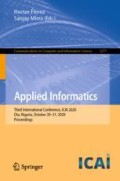Abstract
Context: Requirements validation is an important activity in software development, but frequently neglected in computing courses. This paper describes a study where requirements specifications produced by students are validated by their peers.
Objective: To evaluate how well students perform the validation of requirements specifications.
Methods: A correlational study.
Results: Group’ grades correlate with teachers’ marks for a level of significance of 5%.
Conclusion: Students reviews can be used for peer assessment, but with some care.
Access this chapter
Tax calculation will be finalised at checkout
Purchases are for personal use only
References
Ambreen, T., Ikram, N., Usman, M., Niazi, M.: Empirical research in requirements engineering: trends and opportunities. Requirements Eng. 23(1), 63–95 (2016). https://doi.org/10.1007/s00766-016-0258-2
Heck, P., Zaidman, A.: A systematic literature review on quality criteria for agile requirements specifications. Software Qual. J. 26(1), 127–160 (2016). https://doi.org/10.1007/s11219-016-9336-4
Boehm, B.W.: Software Engineering Economics, 1st edn. Prentice Hall PTR, Upper Saddle River (1981)
De Lucia, A., Qusef, A.: Requirements engineering in agile software development. J. Emerg. Technol. Web Intell. 2(3), 212–220 (2010)
Kuhrmann, M., et al.: Hybrid software development approaches in practice: a European perspective. IEEE Softw. 36(4), 20–31 (2019). https://doi.org/10.1109/MS.2018.110161245
He, L., Carver, J.C., Vaughn, R.: Using inspections to teach requirements validation. CrossTalk: J. Defense Softw. Eng. 21(1) (2008)
Gigante, G., Gargiulo, F., Ficco, M.: A semantic driven approach for requirements verification. In: Camacho, D., Braubach, L., Venticinque, S., Badica, C. (eds.) Intelligent Distributed Computing VIII. SCI, vol. 570, pp. 427–436. Springer, Cham (2015). https://doi.org/10.1007/978-3-319-10422-5_44
Loftus, C., Thomas, L., Zander, C.: Can graduating students design: revisited. In: Proceedings of the 42nd ACM Technical Symposium on Computer Science Education, SIGCSE 2011, pp. 105–110. ACM, New York (2011). https://doi.org/10.1145/1953163.1953199
Topping, K.: Peer assessment between students in colleges and universities. Rev. Educ. Res. 68(3), 249–276 (1998). https://doi.org/10.3102/00346543068003249
Anda, B., Sjøberg, D.I.: Towards an inspection technique for use case models. In: Proceedings of the 14th International Conference on Software Engineering and Knowledge Engineering, pp. 127–134. ACM (2002)
Lahtinen, J.: Application of the perspective-based reading technique in the nuclear I&C context: CORSICA work report 2011. VTT Technical Research Centre of Finland, No. 9. VTT Technology (2012). http://www.vtt.fi/inf/pdf/technology/2012/T9.pdf
Basili, V.R., et al.: The empirical investigation of perspective-based reading. Empirical Softw. Eng. 1(2), 133–164 (1996). https://doi.org/10.1007/BF00368702
Atoum, I.: A scalable operational framework for requirements validation using semantic and functional models. In: Proceedings of the 2nd International Conference on Software Engineering and Information Management, ICSIM 2019, pp. 1–6. ACM, NY (2019). https://doi.org/10.1145/3305160.3305166
Nazir, S., Fatima, N., Chuprat, S.: Modern code review benefits-primary findings of a systematic literature review. In: Proceedings of the 3rd International Conference on Software Engineering and Information Management, ICSIM 2020, pp. 210–215. ACM, NY (2020). https://doi.org/10.1145/3378936.3378954
Runeson, P., Host, M., Rainer, A., Regnell, B.: Case Study Research in Software Engineering: Guidelines and Examples. Wiley, Hoboken (2012)
Laitenberger, O., Atkinson, C., Schlich, M., Emam, K.E.: An experimental comparison of reading techniques for defect detection in UML design documents. J. Syst. Softw. 53(2), 183–204 (2000). https://doi.org/10.1016/S0164-1212(00)00052-2
Rowlands, K.D.: Check it out! Using checklists to support student learning. Engl. J. 96(6), 61–66 (2007)
IEEE-SA: IEEE Std 830-1998 - Recommended Practice for Software Requirements Specifications, IEEE-SA (1998). https://doi.org/10.1109/IEEESTD.1998.88286
van Lamsweerde, A.: Requirements Engineering: From System Goals to UML Models to Software Specifications. Wiley Publishing, Hoboken (2009)
Heck, P., Zaidman, A.: Quality criteria for just-in-time requirements: just enough, just-in-time?. In: 2015 IEEE Workshop on Just-In-Time Requirements Engineering (JITRE), pp. 1–4 (2015). https://doi.org/10.1109/JITRE.2015.7330170
Runeson, P.: Experiences from teaching PSP for freshmen. In: Proceedings of the 14th Conference on Software Engineering Education and Training, CSEET 2001, pp. 98–107. IEEE Computer Society, Washington, DC (2001)
Jones, C.: A Guide to Selecting Software Measures and Metrics. CRC Press, Boca Raton (2017)
Kalinowski, M., et al.: Supporting defect causal analysis in practice with cross-company data on causes of requirements engineering problems. In: Proceedings of the 39th International Conference on Software Engineering: Software Engineering in Practice Track, pp. 223–232. IEEE Press (2017)
Acknowledgment
The authors would like to thank their colleagues and students.
Author information
Authors and Affiliations
Corresponding author
Editor information
Editors and Affiliations
Rights and permissions
Copyright information
© 2020 Springer Nature Switzerland AG
About this paper
Cite this paper
Sampaio, A., Sampaio, I.B. (2020). Validation of Software Requirements Specifications by Students. In: Florez, H., Misra, S. (eds) Applied Informatics. ICAI 2020. Communications in Computer and Information Science, vol 1277. Springer, Cham. https://doi.org/10.1007/978-3-030-61702-8_35
Download citation
DOI: https://doi.org/10.1007/978-3-030-61702-8_35
Published:
Publisher Name: Springer, Cham
Print ISBN: 978-3-030-61701-1
Online ISBN: 978-3-030-61702-8
eBook Packages: Computer ScienceComputer Science (R0)

